仁爱英语八年级下册Unit6topic2sectionB
仁爱英语八年级下各单元短语归纳完整版

仁爱英语八年级下各单元短语归纳集团标准化办公室:[VV986T-J682P28-JP266L8-68PNN]Unit5TopicOne1.lookexcited看起来兴奋,激动2.feelhappy/disappointed感到高兴/失望3.tastedelicious/good尝起来美味4.soundwonderful/sweet/great听起来精彩/甜美/好,不错5.smellterrible闻起来恶心6.gomad/bad发疯/变坏7.turngreen/yellow变成绿色/黄色8.bepopularwithsb.受某人欢迎9.seem(tobe)unhappy似乎不高兴10.seemtodosth.似乎做,好像做11.gotothemovies=gotoseethemovie去看电影12.invite/asksbtodosth邀请某人做某事13.invitesb.to+sp.邀请某人去/参加…14.oneof+最高级+pl.最…之一15.preparesthforsb=preparesb.sth.为某人准备好某事16.preparetodosth.准备做17.saythanks/hello/sorry/goodbyetosb向某人说声谢谢/你好/抱歉/再见18.Whatashame/pity.真遗憾。
19.get/buytheticketto/for买到…的票20.beabletodo=can/coulddo能够做…21.willbeabletodo将会做…22.onthe/one’sway to在去往…的路上23.onthewayhome/here/there在回家/去这儿/那儿的路上24.rightnow/away=atonce立即,马上25.feel/besorryfor(doing)sth为(做)某事感到抱歉/遗憾/难过26.beangrywithsb.对某人生气27.justnow=amomentago刚才(用于过去时)28.carefor=takecareof=lookafter照顾29.becauseof+n.因为…,由于…30.because+句子因为…,由于…31.cheersbup=makesb.Happy使…兴奋起来32.atlast=intheend=finally最后,最终33.attheendof…在…的末尾/尽头34.atfirst起初,开始smilingfaces笑脸35.noisychildren吵闹的孩子们36.lovelysongs活泼的歌曲37.livealone独居be/feellonely感到孤独38.teachsb.todosth.教某人做39.teachoneselfsth.=learnsth.byoneself自学…eintobeing=beborn出现,形成41.fallinto落入,掉入lookfor寻找42.everywhere=hereandthere到处43.bewithahistoryof200years=haveahistoryof200years=have200 yearsofhistory有着两百年的历史eintobeing=beborn形成efrom=befrom来自46.moreandmore+n./原级越来越来…47.be/becomeinterestedin(doing)sth.对…感兴趣48.makepeacewithsb与某人和解49.findawaytodo/ofdoingsth.找到做…的方法50.Itseems/seemedthat+句子。
Unit+6+Topic2话题考点精讲精练课件+2023-2024学年仁爱版英语八年级下册
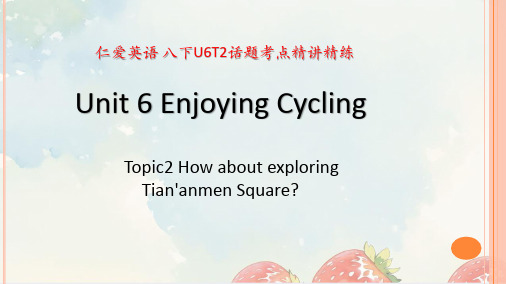
练 It took her three and a half hours to finish the housework. =It took her three hours and a half to finish the housework. 她花了 三个半小时做完了家务。
考点6 Tian’anmen Rostrum is in the north of Tian’anmen Square. 天安门城楼在天安门广场的北面。
since自从……。 I went to sleep after I finished my homework. 我做完作业后就去睡觉。
•时态 1.当主句的时态为一般将来时时,从句用一般现在时。 I will ring (ring) you up as soon as I get to Chongqing. 我一到重庆 就给你打电话。
• in one's direction 朝着某人的方向 in all directions 四面八方 in the direction of 朝着……方向
• step on one's feet/toes 踩到某人的脚/脚趾 step on sth. 踩某物
Don't step on the flowers or grass.
2.until直到……为止,主句谓语动词常为延续性动词。 not...until直到……才……,主句谓语动词常为非延续性动词。
I didn't go to bed until I finished my homework. 我直到做完我的作业 才上床睡觉。 3.after 在……之后,before 在……之前,as soon as 一……就,
2.当主句为一般过去时时,从句常用过去的某种时态。 While I was doing my homework, the telephone rang. 注意:when,while引导时间状语从句时,主从句时态用一般过去时还是 过去进行时,可以根据动词是否有延续性来判断。动词是延续性动词 时常用过去进行时,是非延续性动词时常用一般过去时。 Kangkang was watching TV when the telephone rang.
仁爱版英语八年级下册8B Unit6_Topic2_听力基础训练(含答案和听力材料)

Unit 6 Topic 2 听力基础训练Ⅰ. 听句子,选择正确答语。
每个句子读一遍。
1. A. That’s OK. B. Don’t worry. C. No, thanks.2. A. Yes, I know Helen. B. Yes, this is Helen speaking. C. Yes, I’m here.3. A. No, they’re too busy. B. Yes, they should. C. No, they won’t.4. A. You bet! B. We have no time. C. Oh, you look very happy.5. A. Yes, of course. B. OK, I’d like to. C. You are right.Ⅱ. 听对话,选择正确答案。
每段对话读两遍。
6. Where will Lily live if she goes to Canada for her vacation?A. In Tony’s house.B. In a hotel.C. In Tony’s friend’shouse.7. Who is looking forward to meeting the teacher?A. Mike.B. Jenny.C. Jim.8. Why does Bill look happy?A. He will go to Dalian.B. He will go to Hangzhou.C. He will go to Nanjing.9. Where will Betty visit?A. She will visit the Ming Tombs.B. She will visit the West Lake.C. She will visit the Great Wall.10. How will David explore the northeast of China?A. By bus.B. By bike.C. By car.Ⅲ. 听两段对话,选择正确答案。
仁爱版英语八年级下册:Unit 6 Topic 2. How about exploring Tia
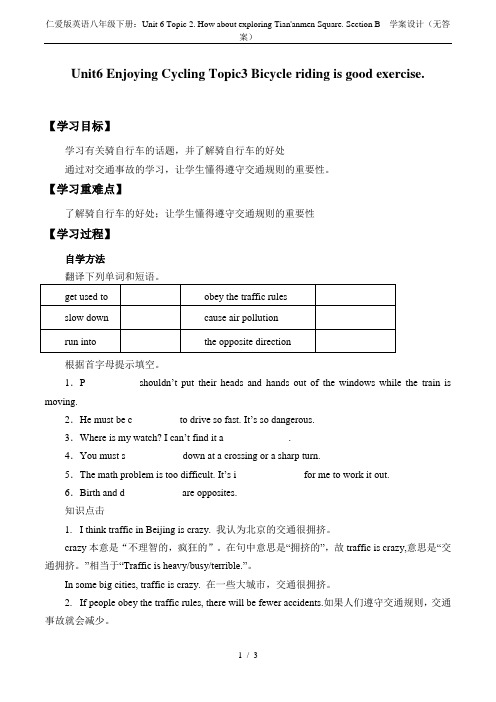
Unit6 Enjoying Cycling Topic3 Bicycle riding is good exercise.【学习目标】学习有关骑自行车的话题,并了解骑自行车的好处通过对交通事故的学习,让学生懂得遵守交通规则的重要性。
【学习重难点】了解骑自行车的好处;让学生懂得遵守交通规则的重要性【学习过程】自学方法根据首字母提示填空。
1.P__________ shouldn’t put their heads and hands out of the windows while the train is moving.2.He must be c_________ to drive so fast. It’s so dangerous.3.Where is my watch? I can’t find it a_____________.4.You must s___________ down at a crossing or a sharp turn.5.The math problem is too difficult. It’s i_____________ for me to work it out.6.Birth and d___________ are opposites.知识点击1.I think traffic in Beijing is crazy. 我认为北京的交通很拥挤。
crazy本意是“不理智的,疯狂的”。
在句中意思是“拥挤的”,故traffic is crazy,意思是“交通拥挤。
”相当于“Traffic is heavy/busy/terrible.”。
In some big cities, traffic is crazy. 在一些大城市,交通很拥挤。
2.If people obey the traffic rules, there will be fewer accidents.如果人们遵守交通规则,交通事故就会减少。
仁爱版八年级下册Unit6 Topic2配套练习和单词

Unit 6 Topic 2AD(Darren): Hello! I’d like to speak to Michael.M(Michael): This is Michael speaking. Oh, Darren! 1 ? D: Fine. Glad to receive your postcard. While you were enjoying your trip, I was busy preparing for my exams. But now 2 .M: Would you like to come to China for your vacation?D: 3 ! And what shall we do?M: Why not explore Beijing on our bicycles?D: 4 ! See you.(Forty minutes later, at Kangkang’s)M: Hey, Kangkang, Darren, my friend from San Francisco, is coming to visit me. When he arrives, I’d like you to meet him.K(Kangkang): Great! 5 meeting him. M: before he comes, would you help me make a plan to explore Beijing?K: Yes, of course. How about exploring the Ming Tombs?M: That would be very interesting.BD(Darren): Hello, Kangkang. 1 the Ming Tombs?K(Kangkang): Sure. They are 2 the Tianshou Mountains, in the northwest of Beijing.D: They must be great.K: Yeah. The Tombs spread over an area of 40 km2 . The Stone Arch 3the Sacred Way to the Tombs. On both sides of the Way, there are some stone animals and stone of officials. In the old days, only the emperors could ride horses through it.D: I see. Did most emperors start to build their tombs when they became emperors?K: Yes. They surveyed the area to 4 their tombs faced south and had mountains behind them.D: That’s interesting! By the way, 5 the Ming Tombs? K: It’s about two and a half hours by bike.D: OK, let’s go and explore them.Unit 6 Topic 21. 在---脚下2. 休息3. 计划做某事4. 玩得高兴5. 云海6. 吃大餐7. 忙于做某事8. 进行9. 在度假10. 的确,当然11. .期望做某事12. 蔓延,拖延13. 的开端14. 在……的两边15. 在过去,在古代16. 开始做某事17. 确信18. 两个半小时19. 辨别….20. 在…东面(指…范围外/内/接壤)21. 停车场22. 寻找停车的空地23. 对……感到惊奇24. 拿出25. 照相26. 以不同方向27. 踏,踩28. 冲出29. 看不见,在视野之外30. 如此…以致…(引导结果状从)31. 以便,为了(引导目的状从)32. 直到…才…(引导时间状从)33. 互相34. 一…….就…(引导时间状从)35. 以……著名36. 禁不住做某事37. 对……感到满意38. 注意39. 象征40. 对……喊41. 到处42. 寻求某人的帮助43. 谢天谢地44. 收到,得到45. 明信片46. 考察,探险47. 对话48. 完美的,极好的49. 野营度假50. 远足,徒步旅行51. 西北52. 拱门53. 标明,作记号于54. 开始,开端55. 神的,神圣的56. 官员,高级职员57. 勘测,查看58. 骆驼59. 威望,声望60. 东方的,东部的61. 北,北方,北部62. 东北(部)63. 东,东方,东部64. 东南65. 参观,观光66. 空间67. 人群,拥挤68. 推69. 方向,方位70. 踩,走,脚步71. 脚趾72. 注意,布告73. 视线,情景74. 跳动,打败(某人),节拍75. 慢慢地76. 巨大的,庞大的77. 在……旁边78. 悲伤地,伤心地79. 发电子邮件80. 背包81. 卫兵,守卫82. 认识到,实现Unit 6 Topic 2 Section AI.根据汉语提示填空1. He (在度假)with his family in Hangzhou.2. Let’s (制定一个计划)to go hiking.3. Her English is (地道的). So let her read the (对话).4. They (忙于算出)the cost of the trip. II.选择题1. — Are you going to watch Yao Ming’s game tonight?—I’m a big fan of his.A. You bet!B. I’m sorry to hear thatC. No way!D. Sure. That would be very nice.2. — Can you finish the work before he tomorrow? — No problem.A. will get hereB. come backC. leaves for ShanghaiD. will arrive3. It was raining I arrived at the station.A. asB. whileC. whenD. as soon as4. We in the forest last weekend when it began to rain.A. enjoyed campingB. were enjoying campingC. enjoyed to campD. were enjoying to camp5. Did you presents your friends on your birthday?A. give, toB. send, toC. borrow, fromD. receive, fromSection BI.根据首字母或汉语提示填空1. — Can you (确保)that all the lights are off when you leave? — Yes, of course.2. (过去), people didn’t have enough food to eat.3. It’s about (骑车十分钟路程)from here to my school.4. There are many trees(在路两边)5. It’s hard to Lucy (区分))her twin sister.6. We use them in the desert for riding on or for carrying goods. They are calledc .II.选择题1. Fujian is the southeast of China, and Taiwan is the southeast of Fujian.A. in, toB. to, inC. to, toD. in, on2. There are many trees on side of the road.A. everyB. eachC. bothD. all3. —is it from our school to Lupu Bridge?— About half an hour’s bus ride.A. How longB. How oftenC. How farD. How much4. It took her to cook the delicious food.A. three and a half hourB. three and a half hoursC. a half and three hourD. three hour and a halfIII.用方框中所给单词的适当形式填空1. I read the story from to end yesterday.2. His house the sea. He can see the white beaches(沙滩)in his bedroom.3. We should the prices on the goods(商品)in the supermarkets.4. The disease over the whole village if we can’t stop it quickly.5. Shanghai is in China.Section CI.根据首字母提示填空1. The heart of an adult man b about 70 to 89 times a minute.2. It’s polite to make s for the old on the bus.3. A large c of people came to the square.4. The t started at the beginning of the summer vacation.5. The boy was so frightened because his mother was out of s .6. — Did you n a girl in white pass by just now.— Sorry, I was reading my book.7. Jack walked toward the d of the post office.II.请选出与句中画线部分意思相同或相近的选项1. Just push the button there, and the coffee comes out here.A. takeB. bringC. pullD. press2. The old man was afraid of falling down, so he stepped slowly in the snowy road.A. rushedB. walkedC. rodeD. flew3. He didn’t go home until the rain stopped.A. whenB. beforeC. afterD. as soon as4. She caught sight of a red car in front of her house.A. sawB. lookedC. looked forD. watched5. He has a big family.A. hugeB. largeC. greatD. manyIII1. I’2. Mother was doing some cleaning father was watching the football match.3. She danced she sang.4. He waited for me late at night.5. He couldn’t help crying he heard the bad news.Section DI.请选出与句中画线部分意思相同或相近的选项1. While we were having fun exploring, I found Darren was lost.A. good atB. enjoyingC. looking forward toD. having a good time2. While we were having fun exploring, I found Darren was lost.A. sawB. watchedC. heardD. noticed3. We found him at last.A. by the endB. finallyC. laterD. after a while4. The town stands at the foot of the mountains.A. sitsB. liesC. facesD. places5. Tom always puts his things here and there.A. somewhereB. some placeC. everywhereD. over thereII.根据汉语意思完成句子1. 这人从背包里掏出一些食物和饮料。
仁爱英语八年级下单词表带音标

仁爱英语八年级下单词表带音标The document was prepared on January 2, 20212018版仁爱英语八年级下单词表Unit5 Topic 1invite n'vat v. 正式邀请disappointed ,ds'pntd adj. 失望的,沮丧的film flm n. 电影;影片smell smel v. 发气;闻到n. 气味seem si:m v.似乎,好像opera `pr n. 歌剧;歌剧剧本excite ksat v.使激动,使兴奋care for 照顾,照料lonely lunli adj. 孤独的,寂寞的;lively 'lavl adj. 充满趣味的;充满生气的cheer up 使振作起来;使高兴起来almost :lmst adv. 几乎,差不多mainly meinli adv. 主要地role r ul n. 角色facial fel adj. 面部的painting 'pent n. 油画,绘画gesture 'dest n. 姿势,手势frightened 'fra tnd adj. 惊吓的;受惊的;害怕的worried ' wrd adj. 担心的,担扰的in the end 最后,终于interestedntr std adj. 感兴趣的upsetp'set adj. 心烦的,苦恼的Topic 2exam gz m n. 考试strict strkt adj. 严格的;严密的be strict with 对……严格要求shy a adj. 害羞的take it easy 别紧张,别着急fail fel v. 不及格;失败;未做someone pron. 某人feeling 'fil n. 感觉;感触;想法joke duk n. 笑话v. 说笑话;开玩笑by the way 顺便提一下;捎带说一声yeah jeadv. 口语是,是的;好的usual ju:ul adj. 通常的,平常的as usualy 像往常一样either er adv. 也pron.二者之一;要么…accept k'sept v. 接受lovely 'lvl adj. 可爱的;美丽的helpful helpfl adj.有用的;有益的international intn nl adj. 国际的useless jusls adj. 无用的,无效的deal di:l v. 处理;给予;发牌deal with 处理,解决;对付elder 'eldr adj. 年长的,年纪较大的refuse rifju:z v. 拒绝,回绝sadness s dns n. 忧伤,悲哀anyoneeniwn pron . 任何人unfair nfe adj. 不公平的,不公正的though eu conj. 虽然,可是even though 即使,尽管not…any longer= no longer 不再Topic 3test test n. 测试,考查,试验nervousn:v s adj. 焦虑的,恐慌的;神经质的speech spi:t n. 演讲CD compact disk光盘relaxed rlkst adj.冷静的,镇定的rich rt adj. 油腻的;丰富的;富有的sick sk adj.生病的,有病的affect 'fekt v.影响confidentknfd ntkɑ:nfd nt adj.自信的,有信心的mood mu:d n.心情;情绪proud praud adj.自豪的,骄傲的be proud of骄傲,自豪anywayeniwe adv.尽管,即使这样read 'red adj准备好的passportpɑ:sp:t n.护照boss bs n. 老板;领班grandson grnsn n.孙子,外孙environment n'varnmnt n. 环境especially 'spel adv. 特别;尤其;专门fill f l v. 装满,充满fill with sth. 使充满,填满,装满trouble 'trbl n.问题,困难,忧虑loud laud adj.大声的,响亮的adv.大声地noise nz n. 声音,响声,噪音,吵闹声spirit 'sprt n. 情绪,心境;精神silentsal nt adj. 不说话的, 沉默的think over 仔细考虑decision d'sn n. 决定;决心make a decision 做决定sense sens n. 感觉,意识relaxing rlks adj.轻松的Review of Unit 5fantastic fntstk adj.极好的,了不起的disappointment ds pntm nt n.失望,沮丧,扫兴soft s:ft adj.轻柔的,柔软的be in trouble有麻烦,处于困难fear fr n. & v.害怕,惧怕difficultydfk lti n.困难,难题,困境Unit6 Topic1field fi:ld n. 田野,田地;场地properprpr pra:pr n.正确的,恰当的mount mant n.山,山峰vehicle vi:kl n. 交通工具;车辆airline 'elan n. 航空公司price prais n. 价格,价钱total 'tl adj. 总的;全部的;partner 'pa:rtnr n.搭档,同伴sleeper 'sli:pr n.卧铺列车pay pei v.付费,付酬hotel h'tel n. 宾馆,旅馆,饭店frigde=refrigerator frid n.冰箱air conditioner er kndn n. 空调standard 'st ndrd adj. 标准的 n. 标准single 'sɡl adj.单一的,单个的condition kn'dn n. 条件,状况comfortable kmfrtbl adj. 舒服的;安逸的;舒服自在的raise reiz v.筹集;使升高;饲养king k n.国王,君主queen kwi:n n.女王,王后common 'ka:mn adj.普通的;一般的;共有的Canadian knedin adj. 加拿大的n.加拿大人的;加拿大人Dollardlr da:lr n. 元货币单位somebodysmb di pron. 某人forward 'f:rwrd adv. 向前;前进hear from 收到某人来信top ta:p n. 顶部,物体的上面;Unit6 Topic 2receive r'si:v v. 收到,得到postcard 'pustkɑ:rd n. 明信片vacation v'ken n.假期on vacation度假explore k'spl:r v. 考察;探险;勘察camp k mp v. 野营,度假work out算出;制定;完成seaside 'si:said n.海边,海滨north n: rθ n. 北;北方;east i:st n. 东,东方adj. 东方的;向东的;东部的adv.向东,朝东west west n. 西adj. 西方的 adv.向西monumentmɑ:njum nt n.纪念碑馆堂像等rostrumrɑ:str m n.指挥台chairmantemn n.主席,主持人announcenans v.宣布,宣告;通知found f and v.建立,兴建;创办republic r'pblk n.共和国meaningful mi:nfl adj.重要的,重大的;wait weit v.等,等待memorial mm:ril adj.纪念的;悼念的northwest `n:rθ'west n. 西北,西北方;西北地区northeast 'n:rθ'i:est n. 东北,东北方;东北地区southeast ‘sauθ'i:st n. 东南,东南方;东南地区bicycle baisikl n.自行车be full of满的,充满的,满是……的crowd kraud n. 人群tour tur n.旅游,旅行;观光,游览space spies n.空间;空地push pu v. & n 推direction d'rekn n.方向,方位step step v.踩;走;跨步n.台阶;slowly 'slul adv. 慢速地,缓慢地beside b'sad prep. 在……旁边sadly 's dl adv. 悲伤地,伤心地as soon as一……就……experience k'sprns n.经历;经验everywhere evriwer adv.处处,到处,各个地方Thank goodness ɡdns 谢天谢地Unit6 Topic3passenger 'p sindr n. 乘客crazy 'kreiz adj. 疯狂的anywhere eniwer adv. 任何地方pollution p'lu:n n. 污染advantage d'v ntd n.优点;优势disagreeds gri: v.不同意,有分歧disagree with sb.不同意,持不同意见riderradr n.骑自行车或马,摩托车的人,骑手careless 'kels adj.不小心的,不仔细的helmet 'helmt n. 头盔light-colored 'lat'kl d adj. 浅色的,淡色的pay attention to注意signalsgn l n.信号,暗号safelyseifti n.安全,平安truck trk n.卡车,载重汽车notice 'nuts v.看到,注意到n.注意reflector rflektr n.反光玻璃case keis n.情况;事例in case of如果,假使aid eid n.帮助;救援first did急救injuryndri n.对躯体的伤害,损伤in a word简言之,一句话,总之look out小心,当心stream stri:m n.小河,溪empty empty adj.空的v.倒空流入,注入Asiae n. 亚洲altitude 'ltitu:d n. 海拔;among m prep.在……中France frɑ:ns n.法国mile mail n.英里stage steid n.阶段;舞台central 'sentrl adj. 中心的,中央的;winner 'wnr n.优胜者,优胜的人cyclist 'saiklist n. 骑自行车的人motorcycle mt r sakl n. 摩托车broken 'brukn adj. 破损的;伤残的;残缺的;出了毛病的Review of Units 5—6explain k'splein v.解释;说明;阐明pedestrian pdestrin n.行人Europejrp n. 欧洲French frent adj.法国的;n.法语town taun n.镇,市镇village 'vld n. 乡村,村庄death deθ n. 死,死亡sharp ɑ: p adj. 急转的;锋利的slow slu v.放慢速度,减缓adj. 缓慢的slow down 减速opposite 'a:pzt adj. 相反的;对面的; prep. 与…相对;在…对面rush r v. 冲,奔跑Unit7 Topic1task t sk n.任务,工作poster 'pust r n.招贴;广告画touch tt n. & v触,碰;触觉get in touch with 与……取得联系try one's best 尽最大努力success sk'ses n.成功,胜利imagine 'm dn v. 想象,设想soup su:p n. 汤cheese ti:z n. 奶酪cookie 'kuki n. 曲奇饼干pancake 'p nkeik n. 薄煎饼set set v.放,置;使出于set the table摆放餐具blind blaind adj瞎的,失明的western 'westrn adj. 西方的,西部的Greek gri:k adj. 希腊的,. 希腊人,希腊语Indianndi n adj. 印度人的;n. 印度人curryk:ri n. 咖喱食品fried frad adj. 油煎的sushi su:i n. 寿司Italian 't ln adj. 意大利人的;意大利语的Africanfrk n adj. 非洲的 n. 非洲人Russianrn adj.俄国人n. 俄国人;俄语address 'dres n.住址,地址regret rgret v.感到遗憾,惋惜n.痛惜懊,悔,遗憾gather ger v.召集,聚集,收集group gru:p n.组,组群v.使成群,成组member membr n.成员,会员roof ru:f n屋顶;顶部.birthplaceb:rθples 出生地formerf:rmr adj.以前的purposep:p s n.目的,意图in order to 为了come true 变为现实,成为事实Unit7 Topic 2finely 'fanl adv. 微小地,细微地oil l n. 油pan p n n. 平底锅lightly 'laitli adv. 轻微地,轻轻地add d v. 增加,添加fry frai v. 用油煎;用油炸ingredient ngri:dint n.成分,原料pot pa:t n. 锅,壶,瓶,罐cooker 'kukr n. 炊具锅,炉灶,烤炉等pork p:rk n. 猪肉cut up 切碎,剁碎ham h m n. 火腿onion 'njn n. 洋葱头noodle 'nu:dl n. 面条bowl bul n. 碗,盒junk food 垃圾食品quick kwik adj.快的,迅速的healthily 'helθiliadv.健康地snack sn k n. 小吃butter 'btr n. 黄油,奶油pear per n. 梨piece pi:s n. 一块片,张,件……slurp sl:rp v. 喝东西时出啧啧的声音impolite ,mp'lat adj. 不礼貌的,粗鲁的noisily 'nzl adv. 喧闹地,聒噪地polite p'lat adj. 有礼貌的,有教养的formal 'frml adj. 正式的manner 'm nr n. 方式;举止;态度table manners 餐桌礼节,用餐的规矩napkin 'n pkn n. 餐巾lap l p n. 人坐时膝部fork f:rk n.叉,餐叉dish d n.菜肴;碟,盘eat up 吃光,吃完quietly 'kwatl adv.安静的,寂静的drink to sb./sth. 为某人/某事干杯或祝酒dine dain v.进餐,用饭elbow 'elbu n. 肘;肘部spoon spu:n n. 匙,调羹chopstick 'ta:pstk n. 筷子finger fgr n. 拇指以外的任何一个手指southern 'sern adj. 南方的,南部的seafood 'si:fu:d n. 海鲜,海味pick pik v.采,摘;拾起;采集;挑选pick up 捡起;获得;收拾sausages:sd 香肠Unit 7 Topic3lady 'ledi n. 女士,夫人gentlemandentlm n n. 绅士,先生sale sel n.卖,出售for sale 供出售,待售guest gest n. 客人,宾客kind-hearted kand 'hɑ:td adj. 好心的menu 'menju: n. 菜单beer b n. 啤酒bill bl n. 账单;美钞票,纸币corn k :rn n.谷物,谷粒salad 's ld n. 蔬菜沙拉lemon 'lemn n. 柠檬tofu 'tfu: n. 豆腐main course mein krs主菜bean bi:n n.豆carrot 'k rt n.胡萝卜dessert dz:rt n.甜点,甜食wine wain n. 酒seat si:t n.座位,座处have a seat 请坐job da:b n. 工作,职业worth w:rθ adj. 值得…的;有…价值的effort 'efrt n. 努力,艰难的尝试successfully sk'sesfl adv. 成功地steak steik n. 牛排,肉排,鱼排neatly 'ni:tli adv. 整洁地,整齐地regularly 'regjlrl adv. 有规律地,定期地diet 'dait n. 日常饮食,日常食物in short总之;简言之not only ... but also ... 不仅…而且…conclusion kn'klu: nn.结论,推论Review of Unit 7educationedu ken n.教育develop dvelp v. 使成长,使发展lamb l m n.羊羔肉;羔羊dislike dislaik n. & v.不喜欢;厌恶cola kul n. 可乐饮料Unit8 Topic 1costume 'kstju:m n. 服装;戏服smooth smu:e adj.平坦的,光滑的so ... that ... 如此……以至于……cotton 'ka:tn adj.棉布制的;n.棉花;棉布silk slk n. 蚕丝,丝织品fashion 'f n n. 时装;时尚;流行式样handbag 'hndbg n. 女用皮包,手提包afford 'f:rd v.买得起;能做tie tai n. 领带;绳子v. 用绳、线系,拴,扎sweater 'swet n.厚运动衫,毛衣scarf skɑ:rf n. 围巾,领巾jeans di:nz n. 牛仔裤blouse blauz n. 女式短上衣;衬衫section 'sekn n.部门,部分sock sa:k n. 短袜pocket 'pa:kt n. 口袋windbreaker 'wndbreik n. 风衣size saiz n. 尺寸,大小leather 'lee adj. 皮制的;n. 皮革pretty 'prt adj.漂亮的,俊俏的adv.,非常handsome 'h nsm adj. 英俊的congratulation kngr tulen n.祝贺ownn adj. 自己的,本人的 v. 有,拥有succeed sksi:d v.达到目的;成功suitable 'sutbl adj. 合适的,适宜的customer 'kstmr n. 顾客,客户simple 'smpl adj.简单的,简易的style stal n. 样式;款式;方式;风格,作风contrastkɑ:ntr st v. 对比,对照fancy 'fnsadj.绚丽的,花哨的design d'zan n. 设计;设计方案;v. 设计, broad br:d adj.宽阔的,广阔的;广泛的waist weist n. 腰,腰部cold-colored k ld 'kl d adj.冷色调的slim slm adj. 苗条的,纤细的,单薄的business bzns n.生意;公事;职责skin skn n.皮,皮肤material mtril n.材料,布料uniform 'ju:nifrm n. 制服kimono k'mn n. 日本的和服sportswearsp: rtswer n. 运动服装easygoing adj. 随和的saying 'se n. 俗话,谚语functionfkn n.作用,功能,职能discuss d'sks v.讨论,谈论meaning mi:n n.意义,意思Unit8 Topic2depend d'pend v.取决于depend on 取决于;依靠,依赖discipline 'dspln n. 纪律,风纪survey sr'vei v.调查 n.民意测验interview 'ntrvju: v. & n. 采访;面试plain plein adj. 普通的;家常的plain clothes 便衣;便服carry out 执行,开展gatekeeper 'geitki:pr n. 门卫suit su:t n.套装,一套衣服v.适合attendant 'tendnt n.服务员,侍者take off 脱下衣服,摘掉enter 'entr v. 进去,进入,加入knee ni: n.膝盖,膝关节occasion 'kein n.特别的事情或仪式,庆典;时机correctly k'rektli adv.正确的,精确地text 'tekst n.正文,文本reason ri:zn n.原因,理由firefighter 'farfatr n. 消防人员heat hi:t n.温度;热v.把……加热ceiling 'si:l n. 天花板,顶棚soldier 'suldr n. 士兵,战士official 'fl n.官员,高级官员airport 'ep:rt n. 航空站,飞机场officer ':fisr n. 警官;军官patient 'pent n.病人adj.有耐心的,能忍耐的spread spred v.传播,展开daily 'del adj.每日的,日常的opinionpnj n n.意见,想法,看法in one's opinion 在某人看来greatly 'greitli adv.非常,很,大大的northern 'n:rern adj.北方的,北部的casual ku l adj.随便的,漫不经心的beautifullybju:tfli adv.漂亮地,美好地boot bu:t n.长筒靴,靴as well as 除……之外;也;还similar 'smlr adj.类似的,相像的dressingdres n.穿戴,穿衣Unit8 Topic3catwalk ktw:k n. 狭长表演台,T形台cheongsam t:s m n. 旗袍traditional tr'dnl adj. 传统的;惯例的minority ma'n:rt n. 少数民族;少数Tibetan t'betn n. 西藏人;西藏语Korean k'rn n. 朝鲜人,韩国人decoration dekren n. 装饰,修饰knot na:t n.用绳索等的结,装饰性花结dynasty 'danst n. 王朝,朝代from then on 从那时起Asianen adj. 亚洲的,亚洲人的;n. 亚洲人personalp:rs nl adj. 个人的,私人的attractive trktv adj. 迷人的,western-style adj. 西方款式的express k spres表达;表示;表露Mongolian ma:'ɡln n. 蒙古人above bv .在……上面list list v.列清单,把……列表n.一览表;清单well-known welnnadj. 众所周知的,着名的item 'atm n. 一件商品物品;项目choice ts n. 选择;抉择marriage 'm rd n. 结婚,婚姻celebration selbren n. 庆祝;庆祝会Review of Units 7— 8saleswomanselzm n n.女售货员mix miks v.混合,参合as a result rzlt作为结果。
Unit 6 Topic 2【复习课件】八年级英语下册单元复习(仁爱版)
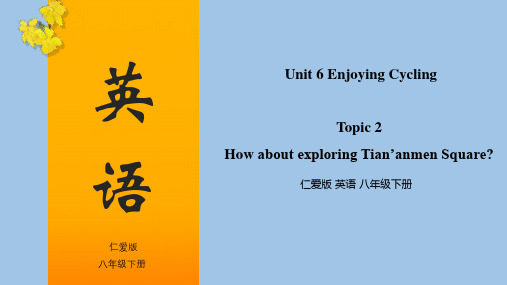
5.chairman 主席 10. memorial 纪念的
III. 根据单词写出汉语意思。
11.northwest 西北 16.sadly
悲伤地
12. northeast 东北 17.announce 宣布
13. southeast 东南 18. republic 共和国
14.crowd 15.slowly
6. 迫不及待做某事
can't wait to do sth.
7. 禁不住做某事
can't help doing sth.
8. 直到...才
not...until
9. 从做某事中得到乐趣 have fun doing sth.
10. 求助某人
turn to sb./ask sb. for help
1. 当她听到这个坏消息,她情不自禁地哭了。
WW高频aa考rrm点m导ii导nn航gg uupp
1. While you were enjoying your trip to Mount Tai, I was busy preparing for my exams. “当你在泰山旅行时, 我正忙于准备考 试。”
(1)be busy His sons who are busy wwoorrkkiinngg don’t care for him on his special day. “他那些忙于工作的儿子们在这个对他来说很特殊的 日子里不关心他。” (改编自 2021·四川泸州)
C.doing, doing
【答案】C 【解析】句意:——运动会那天你忙着做运动吗?——是的,我玩得很开心。
考查非谓语。固定短语be busy doing sth.意为“忙于做某事”;have a good time doing sth.意为“做某事很开心”。故选C。
仁爱版英语八年级下册8B Unit6_Topic2_同步检测题(二)(含答案解析,无听力)

Unit 6 Topic 2 同步检测题(二)第一部分听力(20 分)(略)第二部分基础知识运用(55 分)( )1. —Mr. Li, could you help me? I can’t decide ____ I want to be an artist or not.—No problem. You can first go to National Art Museum of China and learn about the life of the artists, then you can make a decision.A. ifB. whetherC. whichD. that( )2. It’s raining heavily, we’ll have to wait ______ the rain stops.A. as soon asB. tillC. whenD. after( )3. I heard from my pen pal yesterday, but I haven’t replied ______ her.A. toB. forC. ofD. on( )4. To do the work more successfully, ______ we need is more time.A. only whatB. all whatC. all thatD. only( )5. —Could you tell me ______ ?—Glad to help.A. if you have been to the Great WallB. where did he studyC. how I can get to the stationD. what’s your name( )6. We must read the introduction ______ the medicine carefully before we take it.A. toB. forC. ofD. on( )7. The baby kept on ______ until the mother came back.A. cryB. criesC. criedD. crying( )8. Zhang Guorong is a famous singer and actor. It’s a pity that he ______ . A. dies young B. young dies C. died young D. young died( )9. —You shouldn’t slap your brother ______ the face.—I’m really sorry. I won’t do that again.A. onB. atC. inD. across( )10. The scene here is different ______ that ______ the distance.A. of; inB. of; onC. from; inD. from; onⅡ.情景交际。
仁爱英语八年级知识点梳理UNIT6 TOPIC 2

44、太---而不能--- too --- to --46、最后、终于 at last/in the end/finally
48、人群 the crowd of people 50、旅游经历 Hale Waihona Puke ravel experiences
51、作为----而闻名 be famous as--- 52、骑车去--- ride to ---
We didn`t leave the park until the rain stopped.
20、一听到这个消息他就情不自禁的哭了。
He couldn`t help crying sa soon as he heard the news.
21、他的话对我们意义非凡。
His words is quite meaningful to us.
27、毛主席纪念堂 Chairman mao memorial Hall 28、人民大会堂 Great Hall of the People
29、国家博物馆 National Museum
30、位于、坐落于 lie/be in
31、骑自行车 ride bikes/go cycling
32、arrive/reach/get
9、考察女人谷咋样?
How/What about exploring the Women Mountain Valley?
10、你能来和我们一起去宜昌吗?
Can you come along with us to Yichang?
11、为什么不进来坐下?
Why not(Why don`t you) come in and take a seat?
北京仁爱版初中英语八年级下册 Unit6 Topic2 课文填词(含课文原文)

仁爱英语八年级下册课文填词Unit6 Topic2 How about exploring Tian’anmen Square?SectionA-1aDarren:Hello! This is Darren. I'd like to to Michael.Michael:This is Michael (speak). Oh, Darren! How are you?Darren:Fine. Glad to receive your [ˈpəʊstkɑːd] . While you were (enjoy) your trip to Mount Tai, I was busy (prepare) for my (exam). But now I'm vacation.Michael:Would you like to come to China for your[veɪˈkeɪʃn]?Darren:Great idea! See you.(Forty minutes (late), at( Kangkang))Michael:Hey, Kangkang. Darren, my friend San Francisco, is (come) to visit me. I'd like you to meet him me when he (arrive).Kangkang:Great! I'm (look) [ˈfɔːwəd] to (meet) him.Michael:Would you help me make a plan to explore Beijing he comes? Kangkang:Yes, of course. How exploring Tian'anmen Square?Michael:That would be very [ˈɪntrəstɪŋ] .SectionB-1aDarren:Hello, Kangkang. Could you tell me (thing) about Tian'anmen Square? Kangkang:Sure. It is in the center Beijing City. It's largest city square in the world. It (cover)440 000 square meters. It's 880(meter) long from northto and 500 meters w from[iːst] to west. It can hold one [ˈmɪljən] people.Darren:That's (amaze)! Are there any great (building)?Kangkang:(c ertain). We can see the Mounment to the People's (h ero) in the center of the square. In the[nɔːθ] of the[skweə(r)] , we can see Tian'anmen Rostrum. There Chairman Mao Zedong(announce) the(found) of the People's Republic of China1949.Darren:The square must (be) quite (meaning) to all (China) people.Kangkang:Yes, there are many(story) about it. And we can see some[ˈʌðə(r)] great buildings there.Darren:Wow, I (can) wait see it. By the way, how far is it here to Tian'anmen Square?Kangkang:It's about one and a half (hour) by bike.SectionC-1aAfter they(ride) their bicycles for one and a half hours, Kangkang, Michael and(fill)(they) bicycles.After(park) their bicycles, they walked to Tian'anmen Square.Darren and Michael were(surprise) at Tian'anmen Square.They took out a camera and(take ) many(picture).As they were(explore) happily, more more peoplecame to square.W the crowd was pushing Darren in all (direction), someone stepped on his (foot)."Ouch! Don't[pʊʃ] !" he shouted.When Darren(final) pushed his way, he(could) find his friends.He was too(worry) to think what to do.His heart was (beat)fast.Slowly he walked to the near side the square and (sit) on a step beside a tree(sad).He raise his head until someone (call) him.It was Kangkang."Oh, Darren! There you are! It's great to find you!"As soon the three boys saw each other, they all jumped around (happy).Unit6 Topic2 How about exploring Tian’anmen Square?(课文原文)SectionA-1aDarren:Hello! This is Darren. I'd like to speak to Michael.Michael:This is Michael speaking. Oh, Darren! How are you?Darren:Fine. Glad to receive your postcard. While you were enjoying your trip to Mount Tai, I was busy preparing for my exams. But now I'm on vacation.Michael:Would you like to come to China for your vacation?Darren:Great idea! See you.(Forty minutes later, at Kangkang's)Michael:Hey, Kangkang. Darren, my friend from San Francisco, is coming to visit me. I'd like you to meet him with me when he arrives.Kangkang:Great! I'm looking forward to meeting him.Michael:Would you help me make a plan to explore Beijing before he comes? Kangkang:Yes, of course. How aout exploring Tian'anmen Square?Michael:That would be very interesting.SectionB-1aDarren:Hello, Kangkang. Could you tell me something about Tian'anmen Square? Kangkang:Sure. It is in the center of Beijing City. It's the largest city square in the world. It covers 440 000 square meters. It's 880 meters long from north to south and 500 meters wide from east to west. It can hold one million people.Darren:That's amazing! Are there any great buildings?Kangkang:Certainly. We can see the Mounment to the People's Heroes in the center of the square. In the north of the square, we can see Tian'anmen Rostrum. There Chairman Mao Zedong announced the founding of the People's Republic of China in 1949.Darren:The square must be quite meaningful to all Chinese people.Kangkang:Yes, there are many stories about it. And we can see some other great buildings there.Darren:Wow, I can't wait to see it. By the way, how far is it from here to Tian'anmen Square?Kangkang:It's about one and a half hours by bike.SectionC-1aAfter they rode their bicycles for one and a half hours, Kangkang, Michael and Darren arrived at a parking lot near Tian'anmen Square.The parking lot was full of tour buses, cars and bicycles, so they had to look for space to park their bicycles.After parking their bicycles, they walked to Tian'anmen Square.Darren and Michael were surprised at Tian'anmen Square.They took out a camera and took many pictures.As they were exploring happily, more and more people came to the square.While the crowd was pushing Darren in all directions, someone stepped on his feet."Ouch! Don't push!" he shouted.When Darren finally pushed his way out, he couldn't find his friends.He was too worried to think about what to do.His heart was beating fast.Slowly he walked to the near side of the square and sat on a step beside a tree sadly.He didn't raise his head until someone called him.It was Kangkang."Oh, Darren! There you are! It's great to findyou!"As soon as the three boys saw each other, they all jumped around happily.。
仁爱版英语八年级下册8B Unit6_Topic2_听力基础训练(含答案和听力材料)
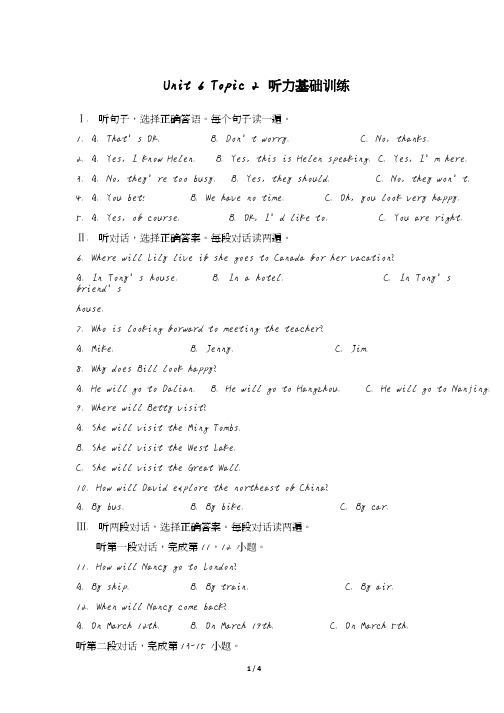
Unit 6 Topic 2 听力基础训练Ⅰ. 听句子,选择正确答语。
每个句子读一遍。
1. A. That’s OK. B. Don’t worry. C. No, thanks.2. A. Yes, I know Helen. B. Yes, this is Helen speaking. C. Yes, I’m here.3. A. No, they’re too busy. B. Yes, they should. C. No, they won’t.4. A. You bet! B. We have no time. C. Oh, you look very happy.5. A. Yes, of course. B. OK, I’d like to. C. You are right.Ⅱ. 听对话,选择正确答案。
每段对话读两遍。
6. Where will Lily live if she goes to Canada for her vacation?A. In Tony’s house.B. In a hotel.C. In Tony’sfriend’shouse.7. Who is looking forward to meeting the teacher?A. Mike.B. Jenny.C. Jim.8. Why does Bill look happy?A. He will go to Dalian.B. He will go to Hangzhou.C. He will go to Nanjing.9. Where will Betty visit?A. She will visit the Ming Tombs.B. She will visit the West Lake.C. She will visit the Great Wall.10. How will David explore the northeast of China?A. By bus.B. By bike.C. By car.Ⅲ. 听两段对话,选择正确答案。
北京仁爱版初中英语八年级下册 Unit 6 Topic 2 课文翻译
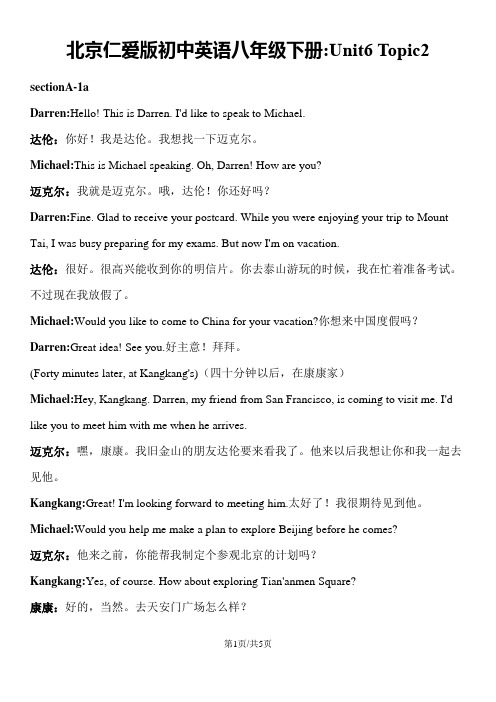
北京仁爱版初中英语八年级下册:Unit6 Topic2S ectionA-1aDarren:Hello! This is Darren. I'd like to speak to Michael.达伦:你好!我是达伦。
我想找一下迈克尔。
Michael:This is Michael speaking. Oh, Darren! How are you?迈克尔:我就是迈克尔。
哦,达伦!你还好吗?Darren:Fine. Glad to receive your postcard. While you were enjoying your trip to Mount Tai, I was busy preparing for my exams. But now I'm on vacation.达伦:很好。
很高兴能收到你的明信片。
你去泰山游玩的时候,我在忙着准备考试。
不过现在我放假了。
Michael:Would you like to come to China for your vacation?你想来中国度假吗?Darren:Great idea! See you.好主意!拜拜。
(Forty minutes later, at Kangkang's)(四十分钟以后,在康康家)Michael:Hey, Kangkang. Darren, my friend from San Francisco, is coming to visit me. I'd like you to meet him with me when he arrives.迈克尔:嘿,康康。
我旧金山的朋友达伦要来看我了。
他来以后我想让你和我一起去见他。
Kangkang:Great! I'm looking forward to meeting him.太好了!我很期待见到他。
Michael:Would you help me make a plan to explore Beijing before he comes?迈克尔:他来之前,你能帮我制定个参观北京的计划吗?Kangkang:Yes, of course. How about exploring Tian'anmen Square?康康:好的,当然。
仁爱英语八年级下期unit 6 topic 2重点短语及句型

Unit 6 topic 2 重点短语 1.be glad to do sth. 很高兴做某事 2.get/receive sth. from sb. 收到某人的某物 3.be busy doing sth.=be busy with sth.忙于做某事 4.be on vacation 在度假 5.make a plan to do sth. =plan to do sth. 制定做某事的计划 6.make a plan for sth. 为某事制定计划 7.That would be very interesting.那一定会很有趣吧。 e along with sb. 跟随某人 9.knock at / on 敲(门,窗等) 10.go camping 去野营 11.work out 计算出,找到……的答案(代词放中间) 12.in the center of 在……的中心 13.ten meters long/ wide/ high /tall 十米长/宽/高
as(一边…一边,随着) before(在…之前), after(在…之后), until (直到…为止,常用not…until…), as主从句时态一致。 1.主句是过去时,从句用相应的过去时。 2.主句是将来时,从句用一般现在时表将来。(主 将从现原则)
14.can’t wait to do sth. 迫不及待做某事 13.how far 多远(对两地的距离提问) 14.by the way顺便问一下 15. one and a half hours = one hour and a half 一个半小时 16.two hours by bike = two hours’ ride 骑车两小时的路程(提问用how far) 17.in the east of 在….的东部(指……范围内) 18.on the east of 在…的东面(指接壤,互不管辖) 19.to the east of 在…的东面(不接壤,互不管辖) 20.be full of =be filled with=fill with 充满,装满 21.be surprised at对……感到惊奇 22.be surprised to do sth. 很惊讶地做某事 23.take out拿出 24.take pictures/ photos照相
仁爱英语八年级下册Unit-6---Topic-2复习题
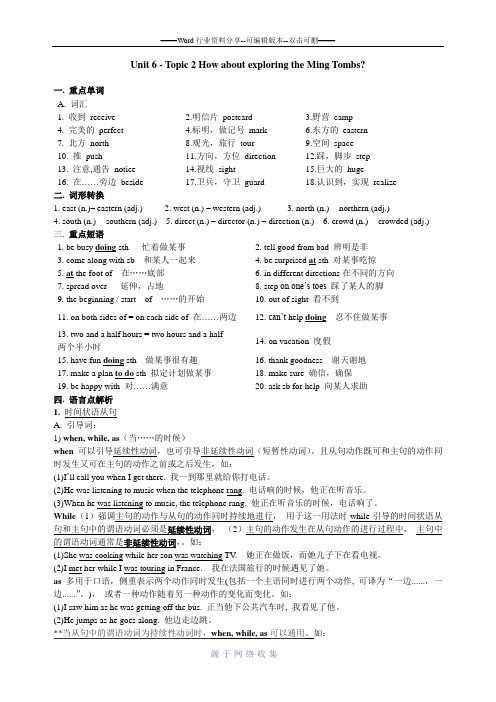
Unit 6 - Topic 2 How about exploring the Ming Tombs?一. 重点单词A. 词汇1. 收到receive4. 完美的perfect7. 北方north10. 推push13. 注意,通告notice 16. 在……旁边beside 2.明信片postcard4.标明,做记号mark8.观光,旅行tour11.方向,方位direction14.视线sight17.卫兵,守卫guard3.野营camp6.东方的eastern9.空间space12.踩,脚步step15.巨大的huge18.认识到,实现realize二. 词形转换1. east (n.)– eastern (adj.)2. west (n.) – western (adj.)3. north (n.) -- northern (adj.)4. south (n.) -- southern (adj.)5. direct (n.) – director (n.) – direction (n.)6. crowd (n.) -- crowded (adj.)三. 重点短语1. be busy doing sth 忙着做某事2. tell good from bad 辨明是非3. come along with sb 和某人一起来4. be surprised at sth 对某事吃惊5. at the foot of 在……底部6. in different directions在不同的方向7. spread over 延伸,占地8. step on one’s toes踩了某人的脚9. the beginning / start of ……的开始10. out of sight 看不到11. on both sides of = on each side of 在……两边12. can’t help doing忍不住做某事13. two and a half hours = two hours and a half两个半小时14. on vacation 度假15. have fun doing sth 做某事很有趣16. thank goodness 谢天谢地17. make a plan to do sth 拟定计划做某事18. make sure 确信,确保19. be happy with 对……满意20. ask sb for help 向某人求助四. 语言点解析1. 时间状语从句A. 引导词:1) when, while, as(当……的时候)when可以引导延续性动词,也可引导非延续性动词(短暂性动词)。
仁爱英语八年级下册单元小测 Unit6 -Topic2(含答案)
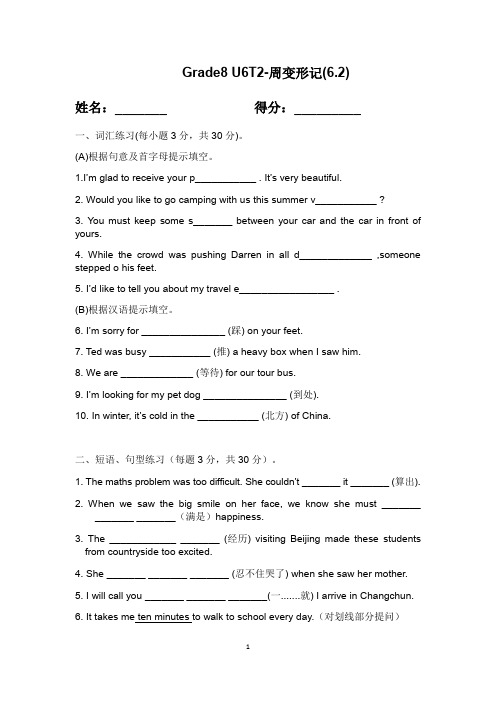
Grade8 U6T2-周变形记(6.2)姓名:_______ 得分:_________一、词汇练习(每小题3分,共30分)。
(A)根据句意及首字母提示填空。
1.I’m glad to receive your p___________ . It’s very beautiful.2. Would you like to go camping with us this summer v___________ ?3. You must keep some s_______ between your car and the car in front of yours.4. While the crowd was pushing Darren in all d_____________ ,someone stepped o his feet.5. I’d like to tell you about my travel e_________________ .(B)根据汉语提示填空。
6. I’m sorry for _______________ (踩) on your feet.7. Ted was busy ___________ (推) a heavy box when I saw him.8. We are _____________ (等待) for our tour bus.9. I’m looking for my pet dog _______________ (到处).10. In winter, it’s cold in the ___________ (北方) of China.二、短语、句型练习(每题3分,共30分)。
1. The maths problem was too difficult. She couldn’t _______ it _______ (算出).2. When we saw the big smile on her face, we know she must ______________ _______(满是)happiness.3. The ____________ _______ (经历) visiting Beijing made these students from countryside too excited.4. She _______ _______ _______ (忍不住哭了) when she saw her mother.5. I will call you _______ _______ _______(一.......就) I arrive in Changchun.6. It takes me ten minutes to walk to school every day.(对划线部分提问)_______ _______ does it take you to walk to school every day?7. When did your father get to ShanXi? (改为同义句)When did your father ________ _______ Shanxi?8. I saw a huge tree beside the river.(对划线部分提问)___________ _________ you see a huge tree?9. The boy was too frightened to say a word.(改为复合句)The boy is ________ frightened ________ he couldn’t say a word.10. I noticed that my friends were singing in the room.(改为简单句)I noticed my friends ______________ in the room.三.用w h e n\ w h i l e\b e f o r e\a s\u n t i l\a s s o o n a s\i n\o n\t o 填空(每题2分。
仁爱英语八年级下Unit 6 Topic 2 SectionB教案设计

仁爱英语八年级下Unit 6 Topic 2 Section B教案设计石柱中学谭红梅一、教案背景1、面向学生:中学2、学科:英语3、课时:14、版本:仁爱英语湘教版八年级下5、学生课前准备:①、预习仁爱英语八年级下Unit 6 Topic 2 section B 中的单词,弄清单词的读音和拼写。
②、自学课文,完成课后的练习。
③、让学生提出自学中遇到的问题。
④、在百度网搜索:了解明十三陵的相关知识。
二、教学课题:How about exploring the Ming Tombs?三、教材分析本节教材选自仁爱英语湘教版八年级下Unit 6 Topic 2 Section B 1a 。
本节内容主要通过谈论旅游的话题,使学生掌握情景交际的语言材料,进一步学习动词不定式的用法。
本节内容从旅游入手,贴近生活,有利于激发学生的学习兴趣,便于他们进一步了解我国的历史,从而激发他们的爱国热情和学习积极性,为后面的教学打下了基础。
教学目标:1.知识目标:A. 通过学习,学生能听懂有关旅游的短文或对话,能从中获取信息。
B. 学生能掌握本课的单词和语言点的用法,80%的学生能熟练运用。
2. 技能目标:培养学生通过看视频和动画熟练运用交际用语的能力,能够运用所学知识自己创设情境表达自己的意愿。
同时通过对话的学习,培养学生的听、说、读、写能力,从而实现用英语进行交际的目的。
3. 情感目标:通过学习,使学生进一步了解我国的历史,培养学生的爱国主义情操,激发他们热爱大自然、热爱祖国的大好河山,勇于探索大自然奥秘的热情。
教学重难点:课文中语言点的用法:They surveyed the area to make sure their tombs faced south and had mountains behind them.Could you tell me something about the Ming Tombs?at the foot of 、in the northwest of Beijingspread out、on both sides ofIt’s about two and a half hours by bike.教学之前用百度在网上搜索明十三陵的相关教学材料,找了很多教案和材料作参考,了解到教学的重点和难点,确定课堂教学形式和方法。
仁爱版英语八年级下册:Unit 6 Topic 2How about exploring Tian'

Unit 6 Enjoying CyclingTopic 2 How about exploring Tian’anmen SquareLearning aims and demands.1.New words, everywhere. Thank goodness!2.Structures.While we we re having fun exploring, I found that Darren was lost.Thank goodness!What a special trip!3.Grammar. Adverbial Clauses of Time.Learning important and difficult points.1.Adverbial Clauses of Time.2.The form of the diary.Learning steps.自主预习Finish the sentences, then read and translate them into Chinese.1.__________ you were enjoying your trip, I was busy preparing for my exams.2.I’d like you to meet him with me __________ he arrives.3.Would you help me make a plan to explore Beijing __________ he comes?4.__________ they were exploring happily, more and more people came to the square.5.He didn’t raise his head __________ someone called him.6.__________ the three boys saw each other, they all jumped around happily.7.That would __________ very interesting.8.The Tian’anmen Rostrum is __________ Tian’anmen Square.默写1.检查自行车和包裹____________________2.过1.5小时____________________3.一张大的毛主席相片____________________4.第一面国旗____________________5.在广场中心____________________6.开心____________________7.谢天谢地____________________ 8.到处____________________9.满的_________________ 10从四面八方__________________.11.观光巴士_________________ 12. 禁不住_________________13.从人群中挤出______________14.我们对他所说的话感到吃惊。
仁爱版英语8年级下册 Unit6_Topic2_SectionB_教案设计

Unit6 Topic2 SectionB 参考教案Ⅰ. Material analysis本节课建议用1-2课时学完。
主要活动为Section B 的1a和3a。
本课通过对天安门广场进行描述,引出方向及方位词,并通过谈论天安门各个建筑物的位置关系来练习方向和方位介词。
要求学生通过本课的学习活动掌握黑体单词和短语north, east, west, wait和can’t wait to do sth., 理解白体词汇, 学会如何用英语表达方向。
同时培养学生的热爱旅游、积极探索、热爱祖国的态度。
Ⅱ. Teaching aimsKnowledge aims:1. 学生能正确掌握/θ/ 和/s/的发音技巧,连读技巧和句子的语调;拼读并运用黑体单词。
2. 学生能正确掌握方向和方位词的用法。
3. 学生能进一步掌握时间状语从句的用法。
Skill aims:1. 能听懂有关方向、方位的短文或对话。
2. 能使用英语来表达方位和方向。
3. 能读懂简单介绍事物方位的短文。
4. 能用英语简单介绍事物的方位。
Emotional aims:1. 具有积极参与课堂上各种英语实践活动的兴趣。
2. 培养学生热爱旅游、积极探索、热爱祖国的态度。
Ⅲ. The key points and difficult pointsKey points:1. 正确区分/θ/ 和/s/的发音,掌握连读的技巧和英语语调常识。
2. 正确掌握方向和方位词用法。
3. 了解天安门广场的相关信息和建筑物的名称。
4. 继续学习时间状语从句的用法。
Difficult points:掌握方向和方位词的用法。
Ⅳ. Learning strategies1. 善于创设情景,在情景中提高语言交际能力,突显语言交际功能。
2. 学会借助关键词进行信息的归纳。
Ⅴ. Teaching aidsComputer multimedia projector, the pictures of Tiananmen Square, the map, the video of the founding ceremony in 1949.Ⅵ. Teaching proceduresⅦ. Blackboard design。
仁爱版八年级下册英语unit6-8知识点
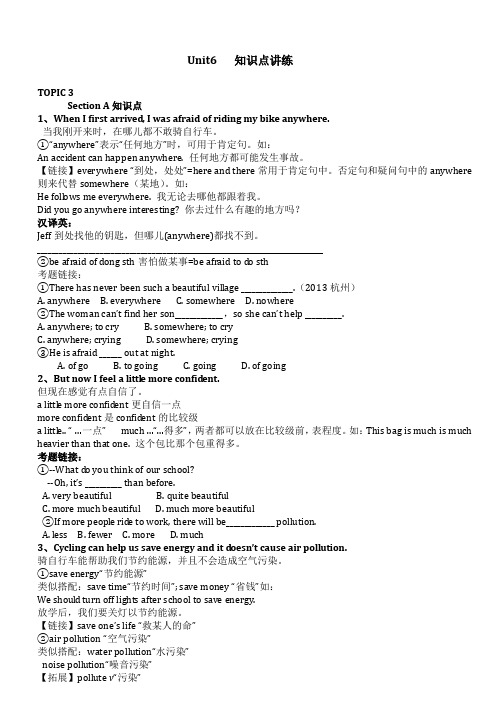
Unit6 知识点讲练TOPIC 3Section A知识点1、When I first arrived, I was afraid of riding my bike anywhere.当我刚开来时,在哪儿都不敢骑自行车。
①“anywhere”表示“任何地方”时,可用于肯定句。
如:An accid ent can happen anywhere. 任何地方都可能发生事故。
【链接】everywhere “到处,处处”=he re and there常用于肯定句中。
否定句和疑问句中的anywhere 则来代替somewhere(某地)。
如:He foll ows me everywhere. 我无论去哪他都跟着我。
Did you go anywhere interesting? 你去过什么有趣的地方吗?汉译英:Jeff到处找他的钥匙,但哪儿(anywhere)都找不到。
______________________________________②be afraid of d ong sth害怕做某事=be afraid to d o sth考题链接:①There has never been such a beautiful village ______________.(2013杭州)A. anywhereB. everywhereC. somewhereD. nowhere②The woman can’t find her son_____________,so she can’t help __________.A. anywhere; to cryB. somewhere; to cryC. anywhere; cryingD. somewhere; crying③He is afraid ______ out at night.A. of goB. to goingC. goingD. of going2、But now I feel a little more confident.但现在感觉有点自信了。
